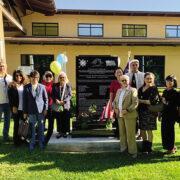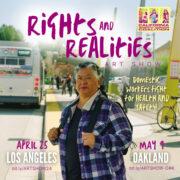A secular holiday specially dedicated to grandparents is celebrated in the United States and being adapted by all countries worldwide. Grandparents, too, like mothers and fathers, were legitimately given their own special day to commemorate their unprecedented significance in the most basic component of society—the family.
Initiated and founded by Marian Lucille Herndon McQuade (1917-2008), a housewife from Oak Hill, West Virginia, the proposal was supported by Senators Jennings Randolph and Robert Byrd which was duly signed by then President Jimmy Carter. In September 1978, a resolution was officially proclaimed designating the first Sunday of September after Labor Day of each year as National Grandparents Day with an integrated statute that cited: to honor grandparents, to give them the opportunity to show love for their children’s children, and to help the latter become aware of the strength, information, and guidance older people can offer.
It wasn’t trouble-free for McQuade, who was a mother of 15 children, a grandmother to 40 grandchildren, and 8 great grandchildren, to campaign setting aside a day for grandparents but through the concerted efforts on the part of civic, business, religious, and political leaders, her advocacy gained support from various capital cities and states.
Having worked in several senior facilities since 1956, aside from the fact that she was elected Vice-Chairman of the West Virginia Committee on Aging, having served as President of the Vocational Rehabilitation Foundation, and being appointed to the Nursing Home Licensing Board, Mrs. McQuade personally knew what and how it was to be in such dreadful and lonely situation that’s why it wasn’t surprising why she chose to dedicate her life to advocating for senior citizens… particularly, the most elderly.
Although the first Grandparents Day was proclaimed locally in West Virginia in 1973 by Gov. Arch Moore, it was Senator Randolph who introduced a resolution in the US Senate but unfortunately suffered desertion and languished in the mounting files of the senate committee.
The media played a significant role when Mrs. McQuade turned to them for assistance to boisterously drumbeat the issue but the legislature, being the main source of “power,” wasn’t left untapped. Mrs. McQuade and her team relentlessly sent letters and appeals to the US Congress and 5 years later after its West Virginia inception, the proclamation was finally signed in 1978.
The significant day was earmarked on a September to signify the “autumn years” of life…a fitting celebrated holiday for senior family members who are merely enjoying the sunset phase of their existence while taking pleasure from the company of their grandchildren.
Even though the noteworthy holiday for grandparents isn’t celebrated as pompously as Mother’s Day or Father’s Day, but the said event is hastily gaining popularity and universal recognition especially with the composition of “A Song for Grandma and Grandpa” by Johnny Prill which the National Grandparents’ Day Council of Chula Vista, California announced its being the official song of the National Grandparents Day.
And as if a song wasn’t enough to strengthen and solidify the event’s significance, the Forget-me-not (s.n. Myosotis Sylvatica), tiny but exquisite blue flowers that bloom during springtime, was specifically preferred as the occasion’s official flower…although, all flowers during the season are considered.
Personally, I believe precious family memories couldn’t be completely collected without our grandparents (and even our grand grandparents)…them being essential dynamics in building a family tree. Our elders undoubtedly serve as the main foundation of what and who we are as a family and the strapping anchor of our present-day survival to meet our destiny.
At my age, being already a senior citizen for 5years with 7 grandchildren from my 3 sons, I couldn’t help but get scared of the inevitable final years of my life. Unknowing of my own lifespan I sometimes dread the imminent occurrences and the unheralded trepidation the future brings. These and much more fears brought about by old age never skip my mind…especially during times when I enjoy the company of my innocent and carefree grandchildren…surely, I will not be able to see their offsprings.
Admittedly, I’m much aware of everyone’s final hour… that every one of us will perish from this earth regardless of how successfully or unsatisfactorily we have played the roles assigned to us. That we’re merely living on some borrowed time. That nothing is permanent and enduring but change. That after all what we have toiled for, amassed or accumulated will be but inconsequential baggage to be left behind. And what legacy shall I bequeath my family? Isn’t it that a gone man still survives when there’s a measure of magnitude and significance attached to his gravestone?
They say children raised by grandparents tend to grow either spoiled or better human beings. Custodial grandparenting, which are common especially among Christian families, is becoming rampant and reaching a significant increase in number. Grandparents assume responsibility because the grandchildren’s parents cannot or choose not to care for the kids, or they’re financially incapacitated, or due to substance abuse, neglect, HIV/AIDS, mental or physical illness, incarceration, abandonment, divorce, or worst of all, death.
I was raised by my grandparents from my mother side for reason neither of the above but simply because I had to be waned being the first born of a growing family, I was brought by my grandparents, who I called Inang Upeng (Guadalupe Castañeda) and Amang Lucio (Lucio Tambongco) to Pinagbuhatan, Pasig (Rizal) where they were tenants of a huge farm land.
Being the only child under the care of two elders gradually developed my excellent disposition in different matters and opened my eyes to the very nature of day to day living. I witnessed my grandfather’s resilience at work in the fields both under the heat of the sun or beneath the pouring rain…and enjoyed with him the bountiful harvest from what he strived for. A tolerant hard laborer with unfaltering ways, Amang Lucio was as physically powerful as his carabao and as pliant like the bamboos that dwarfed the western side of our modest abode.
I was always excited to tug along with my Inang Upeng to the town market to ply our newly harvested produce. Mang Ambo with his horse-drawn two-wheeled caromata would help us load and unload the goods early morning and would service us back in the afternoon. Spoiled, me? Maybe. I just realized I was. I could savor all the native delicacies available along the sidewalks and my Inang Upeng would buy me cheap paper mache toys or a new pair of khaki short pants after market hours… a privilege I enjoyed but never by my siblings or cousins.
I had neither playmates nor a radio but life in the open fields was fulfilling and gratifying. During daytime, when not with my grandpa in plowing the fields or watering crops, the day would unnoticeably pass just flying my kite, racing paper boats by the nearby irrigation canal, or assist my Inang Upeng in pounding palay, hanging laundered clothes or gathering them when dry.
My childhood stint with my grandparents was most extremely memorable. Growing up close with them made it hard for me to part with what I’ve been used to: my Inang Upeng’s touch, her caring ways, her melodious voice, and most of all, her peculiar natural scent. From my Amang Lucio…there’s nothing much about him but one thing was never expunged from my mind until now…his whip that hit my back when I let loose of his fighting cock from its pen. That was also the first time I saw my Inang Upeng cry intensely while cuddling me to ease my pain.
I had to rejoin my family during school opening when I turned seven…but my grandparents, because of the unprecedented attachment we have developed, gave up the farm and stayed with us. Even with my parents and siblings around, I still slept with my Inang Upeng in her room. It was really hard to break the habit I was used to: sleeping with my arms around her or hers around me.
Believe it or not, I was already a teacher but I still slept with my Inang Upeng…while she would trace my whereabouts when night fell and I was still not home. Despite my age I felt like a helpless child for her but that didn’t put me to shame even at times when my co-teachers would tease me when she’s around to check on me.
Imagine my situation when she passed away. Friends who comforted me along the funeral vividly recalled that I was intensely crying seemingly on the top of my voice but sans sound. I felt half of me was gone. I thought that was the end of the world for me. It took a huge amount of time to finally let the pain go and moved on…but up to this day, my grandmother never left my side for she was and always be a part of me…having been molded from the way she was.
Incidentally, a popular Filipino proverb (salawikain) goes: “Mas mahal ang tubo kaysa puhunan…” (Direct translation: the interest is pricier than the capital.) (Idiomatically: the child is more endeared / loved than the parent.)
I find the proverb somewhat factual after having had experienced it myself.
Back in the Philippines my kids would joke their mom that she had to look after her grandchildren since nannies command high pays in the US which my wife would readily respond: “You grew up with yayas (nannies) so spare me from babysitting your kids. Let me enjoy old age!”
Fast forward: after my three sons got married and have families of their own, look now who’s crazy looking forward to weekends and day-offs to be with my boys’ kids — my wife! She never tires with her grandchildren: playing, tutoring, shopping, watching movies, dining out, and having them sleep-over or bringing to or picking them from school when their parents weren’t available…even if it meant calling-in sick and unmindful if it might jeopardize her job.
While the family remains solid and closely-knitted, grandparents or the senior members of the household will stay around enjoying the remaining years of their life. Longer life expectancy will also lead to a longer period of grandparenthood especially during this generation when there is a prevalence of early parenting.
And come to think of it… isn’t a family photo more picture-perfect when grandparents are in the keep-sake shot called family portrait?
For comments and suggestions, please email to: [email protected].




